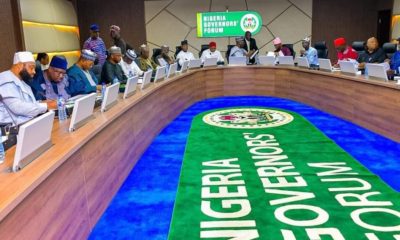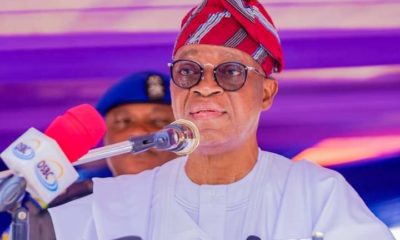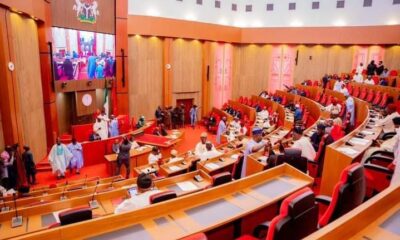Politics
SERAP, 20 Others Sue Akpabio, Abbas, Against Increasing Own Budget

The Socio-Economic Rights and Accountability Project (SERAP) and 20 concerned Nigerians have filed a lawsuit against the Senate President, Godswill Akpabio, and Speaker of the House of Representatives, Tajudeen Abbas “for unilaterally and arbitrarily increasing the allocation for lawmakers from N197bn to N344bn, their highest since the return of democracy in 1999.”
Biztellers reports that the action was brought against Akpabio and Abbas for themselves and on behalf of all members of the National Assembly.
According to Deputy Director, SERAP, Kolawole Oluwadare, the lawmakers had last month raised their allocation from N197bn proposed by President Bola Tinubu to N344bn.
That meant that the lawmakers would in total draw N514bn from the 2024 budget. The lawmakers also in 2023 arbitrarily increased their own budget from the originally proposed N169bn to N228bn, he noted.
In the suit number FHC/ABJ/CS/68/2024 filed last Friday at the Federal High Court, Abuja, the Plaintiffs are asking the court to determine “whether the lawmakers, in the exercise of their powers over appropriation/money bills, can unilaterally increase their own budget without the re-presentation of the budget by the Executive.”
The Plaintiffs are asking the court for “a declaration that the National Assembly, in the exercise of its powers over appropriation/money bills, cannot unilaterally increase its own budget without the re-presentation of the budget by the President in line with section 81 of the Nigerian Constitution 1999 [as amended].”
The Plaintiffs are asking the court for “a declaration that the action of the National Assembly, unilaterally increasing its own budget from N197 billion to N344 billion, without the re-presentation of the budget by the President is a breach of the democratic principles of separation of powers and checks and balances.”
The Plaintiffs are seeking “an order of perpetual injunction restraining and preventing the National Assembly from unilaterally increasing its own budget, in the exercise of its powers over all appropriation/money bills, without the re-presentation of such appropriation/money bills by the President in line with the Nigerian Constitution.”
In the suit, the Plaintiffs are arguing that: “Allowing the National Assembly to continue to unilaterally and arbitrarily increase its own budget would fundamentally undermine the letter and spirit of the Nigerian Constitution, public trust, and the rule of law.”
The Plaintiffs are also arguing that, “The arbitrary and self-serving increase by the lawmakers of their own allocation offends the Code of Conduct for Public Officers [Fifth Schedule Part 1] of the Nigerian Constitution, oath of office, and the democratic principles of separation of powers and checks and balances.”
According to the Plaintiffs, “Unless the reliefs sought are granted, the National Assembly will continue to breach the provisions of the Nigerian Constitution and the rule of law, and at the expense of millions of Nigerians living in poverty.”
The suit filed on behalf of SERAP and 20 concerned Nigerians by their lawyers Kolawole Oluwadare and Andrew Nwankwo.
The petition read in part, “Members of the National Assembly are public officers who have sworn the constitutional oath of office to perform their respective duties in the interest of Nigerian citizens.
“The members of the National Assembly, by unilaterally and arbitrarily increasing their own budget in the Appropriation Bill 2024, without the re-presentation of the budget by the President has violated the Code of Conduct for Public Officers.
“Paragraph 1 of the Code of Conduct for Public Officers which provides that ‘a public officer shall not put himself in a position where his personal interest conflicts with his duties and responsibilities.’
“Members of the National Assembly have put their interest above the public interest and ‘well-being and prosperity of the Federal Republic of Nigeria’, contrary to their oath of office.
“It is a necessary implication of the rule of law that, except where the law gives a discretion to a public functionary, he can only act in accordance with the law, as to do otherwise may enthrone arbitrariness.
“The increase and insertion of line items in the Appropriation Bill 2024 by the National Assembly is not commensurate with the constitutional commitments to public services and goods; decreasing public revenues and increasing level of public debts, and the poor economic and social realities in Nigeria.
“The President presented the Appropriation Bill 2024 made up of N27.5 trillion Naira to the National Assembly on 29 November 2023. The National Assembly on 30th December, 2023 passed the Appropriation Bill 2024 in the sum of N28.7 Trillion.
“That while exercising its legislative powers, the 1st and 2nd Defendants increased the Appropriation Bill by N1.2 Trillion, wherein the 1st and 2nd Defendants unilaterally increased allocations made to the National Assembly in the Appropriation Bill 2024 presented by the President from N197,932,625,616 Billion Naira to N344.85 Billion.
“The President signed the ₦28.7 Trillion Appropriation Bill 2024 into law on 1st January, 2024. The 2024 Budget is in deficit of ₦9.18 Trillion.
“The Budget/Appropriation Act 2024 is yet to be gazetted as at the time of filing this suit and public access to the gazetted 2024 Budget/Appropriation Act is restricted.
“The National Assembly after inserting new line items to the Appropriation Bill 2024 and altering the budgetary allocation to already inserted line items did not submit same to the President for re-presentation by the President before going ahead to present the Appropriation Bill to the President for assent.”
The SERAP and 20 concerned Nigerians are also asking the court for the following reliefs:
“A DECLARATION that the action of the National Assembly, unilaterally increasing the budget of the National Assembly from 197 billion Naira to 344 billion Naira, in the exercise of its powers over Appropriation Bill 2024, without the re-presentation of the budget by the President is a breach of section 81 of the Nigerian Constitution 1999 [as amended], the Code of Conduct for Public Officers [Fifth Schedule Part 1] of the Nigerian Constitution, Oath of office [Seventh Schedule] and section 81 of the Nigerian Constitution.
“AN ORDER OF PERPETUAL INJUNCTION OF THE HONOURABLE COURT restraining and preventing the National Assembly from unilaterally increasing the budget of the National Assembly, in the exercise of its powers over all appropriation/money bills, without the re-presentation of such appropriation/money bills by the President in compliance with section 81 of the Nigerian Constitution 1999 [as amended] and the democratic principles of separation of powers and checks and balances.”
And, “AN ORDER OF THE HONOURABLE COURT directing, compelling and mandating the National Assembly, in the exercise of its powers over all appropriation/money bills, to comply with section 81 of the Nigerian Constitution 1999 [as amended] by sending such appropriation/money bills to the President for re-presentation before the National Assembly in compliance with section 81 of the Nigerian Constitution and the democratic principles of separation of powers and checks and balances.”
The court is yet to fix a date for the hearing of the suit.
Politics
Buhari Calls For Transparency Ahead Of Katsina LG Elections

Former President, Muhammadu Buhari has called for transparency and accountability in the upcoming local government elections in Katsina State.
Speaking during the All Progressives Congress (APC) caucus meeting on Saturday at the Presidential Banquet Hall in the Katsina Government House, Buhari emphasized the importance of these principles in maintaining public trust and political relevance.
“Transparency and accountability are the cornerstones of good governance and are fundamental to sustaining the confidence of the people,” Buhari said.
READ ALSO: Counsel To Otudeko Protests Alleged N12.3bn Fraud Charges
Governor Dikko Radda also addressed party stakeholders at the meeting, urging them to mobilize support at the grassroots level and work towards securing a decisive victory for the APC.
“We are committed to conducting elections that reflect the true will of the people,” Radda stated, highlighting the party’s focus on ensuring transparent, inclusive, and democratic processes.
The governor also underscored Katsina’s political significance, referencing his leadership journey under Buhari’s administration and the recognition the state has received in the form of ministerial and federal appointments under President Bola Tinubu’s government.
In his opening remarks, APC Chairman in Katsina State, Sani Daura, described the caucus meeting as a platform to strengthen party unity and strategize for the elections. He commended Buhari and other stakeholders for their commitment to the party’s success.
Prominent political figures from Katsina, including Senators Abu Ibrahim, Abdulaziz Yar’Adua, Muntari Dandutse, and Nasiru Sani Zangon Daura, were present at the meeting, further underscoring its significance in the lead-up to the elections.
The APC leadership reiterated its commitment to upholding democratic values and ensuring that the local government elections truly reflect the will of the people.
Politics
Leadership Newspaper Backs Adeleke For Second Tenure, Names Him ‘Gov Of The Year’

It was a plethora of pleasantries in Osogbo on Thursday, when Osun State Governor, Senator Ademola Adeleke was named 2024 Governor of the year and endorsed for second tenure in office by the top management of the Leadership Newspaper.
The newspaper’s team was on a courtesy call on Gov Adeleke, Biztellers reports.
Receiving them at the Government House, Gov Adeleke noted that his administration had reduced the infra deficit by over 40 percent.
He added that his administration had also bridged access to primary health care, with an ambition to expand health access at medium and tertiary levels.
He said, “Osun State is constantly getting recognitions for what outsiders and even opposition members regard as our commendable performance.
“In the last one year, our government has been conferred with several awards across the sectors. Aside from reputable newspapers like the leadership stable, we have received accolades from several federal agencies and non-governmental bodies. The consensus from those reviewing our performance and service delivery is that we are true agents of good governance.
“In all these positive ratings, my response has always been to task my team to double their efforts. In the face of overwhelming positive reviews and high approval ratings, I am compelled to drive my team harder. When recently, some opposition figures confessed to our positive ratings, I still believe we have a lot of grounds to cover.
“I am not allowing the praises to enter my head. While it may be true that I have delivered a four-year task in under two years, I am propelled to do more because Osun has been left behind on many fronts. As I have reduced the infra deficit by over 40 percent, my real target Is higher. As I have bridged access to primary health care, my ambition is to also expand health access at medium and tertiary levels. While our records across the sectors are laudable as your newspaper has acknowledged, the ultimate goal is to accelerate infra upgrade alongside the boosting of soft investment for the well-being of our people.
ALSO READ: Lawmaker Introduces Bill To Allow Trump A Third Presidential Run
“I appreciate your candid endorsement of our performance. It is important to note that your yardstick for recognizing us correlates with similar reasons adduced by others. Our huge governance records are undeniable facts especially in workers’ welfare, infrastructure delivery, educational expansion, health care access improvement, solid mineral sector reforms, digital economy initiatives, agricultural mechanisation among others.
“I want to assure the public that our administration is not slowing down. Very soon, I will flag off ongoing remodeling of Osogbo stadium to assume international standard. Prior to the ongoing stadium project, we have engineered the creation of Osun Sport Commission and Osun Sport Fund through appropriate legal and policy framework.
“Very soon, I will be flagging off the dualisation of phase one of Odoori – Post office road at Iwo. The contractor for Iwo -Osogbo road has mobilized to site. We plan to complete the two projects within the life of this administration. Meanwhile, the dualisation project at Ilesa is progressing while the flyover bridge at Ile Ife is ongoing with appreciable progress. 2025 is billed to be a year of further expansion of good governance for the good of man and humanity.
On his part, the Vice Chairman of Leadership Group Mike Okpere, noted that the recognition is in order to give Gov Adeleke an insight and encouragement to do a second term.
“Your excellency you will see that, we didn’t just come down here, we had a meeting before the award and that is why we are here, so this trip is to notify you formally for this award and we personally invite you on the 8th of April at the Banquet Hall of the State House in Asokoro where this award will be handed on over to you.
“Our Reputable Person of the Year is Aliko Dangote, you all are aware of the investment he just concluded, by bringing fuel production into Nigeria, because of that and many other things, we chose him as our person of the year.
“Other person’s that would be sharing the merit are other governors that have touched people’s lives, among them is the Governor from Akwa Ibom State, the Governor of Enugu State, the Governor of Jigawa State and the Governor of Kano State.
“We didn’t call this Leadership Governor of the year, we call it Governor of the year, in other words, what we are saying is that, this recognition will give you an insight and encouragement to do a second term.
“As a newspaper company, we don’t endorse Governors but when we see something we say it, your Excellency sir, I therefore want to present this notification and official invitation”, he added.
Other members of the Leadership Newspaper team includes, Abraham Nda Isaiah, Director, Leadership Group, Ibidiran Ayokunle, Head Southern Operations, Joshua Dada, Osun State.
Politics
C’River Assembly Moves To Amend LG Law, Proposes More Political Appointments

The Cross River State House of Assembly has initiated the process to amend the Local Government Law 2007, introducing provisions to expand political appointments and enhance local government administration across the state.
The bill, sponsored by Rt. Hon. Davies Etta, representing Abi State Constituency, was debated on Tuesday in Calabar.
It proposes increasing the number of appointees in each Local Government Area (LGA) to 50. Among the new roles are 16 Special Adviser positions and a cadre of officials known as Ward Relation Officers.
According to the bill, “The Chairman of Council may appoint such a number of Special Advisers to assist him in the discharge of his duties, provided that appointments, when added to other statutory appointments, shall not exceed a total number of 50.”
The proposed Ward Relation Officers will hold ranks equivalent to Special Advisers and will report directly to the Chairmen of their respective LGAs.
This move, the Assembly says, is aimed at fostering grassroots engagement and improving governance at the local level.
Another key provision of the bill seeks to elevate the office of the Head of Local Government Administration (HOLGA) to the status of a Permanent Secretary within the state public service.
The amendment stipulates that HOLGAs will enjoy all the rights, privileges, and entitlements of Permanent Secretaries, including pensions.
“The office of the HOLGA shall be equivalent to the office of a Permanent Secretary of the State Public Service and shall enjoy all rights and privileges of the Permanent Secretary, including pensions,” the bill states.
It also specifies that appointments to the HOLGA position must be made exclusively from within the local government service in the state.
The bill, which has passed its first and second readings, has been referred to a joint committee on Local Government Affairs, Judiciary, and Public Accounts for further review and consultations with stakeholders.
Speaker of the Assembly, Rt. Hon. Elvert Ayambem, underscored the importance of the proposed amendment, noting that it would strengthen local government administration and improve service delivery to the grassroots.
The Assembly is expected to hold further deliberations before making a final decision on the proposed amendments.




















